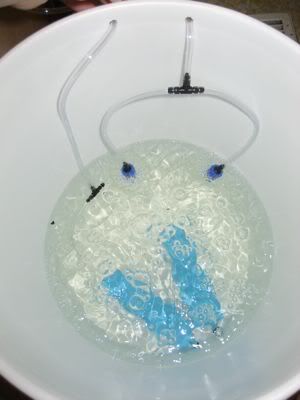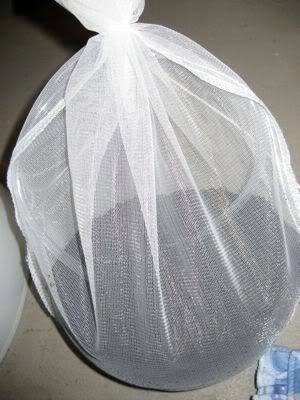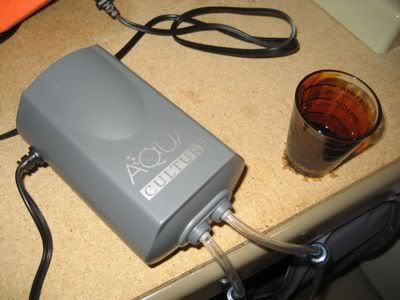
After reading Teaming with Microbes A Gardener's Guide to the Soil Food Web the idea of using compost tea has become quite appealing. Without understanding the science behind the use of compost tea it has always seemed a bit gimmicy to me. Why would you use tea when you can just use compost? Well you can - but understanding a bit of the compelling reasons why microbes are so important to plant health and nutrient uptake and how they can be multiplied in the tea, my question now is, why not?
There are two things working against me putting down more compost in my beds just now giving me a reason or two to look at teas. One, getting an order of compost delivered from the certified organic compost place is going to cost me near $150 which I just don't have to spend on "dirt" at the moment. Two, I have some very small starts in my beds that would just get buried under the weight of the compost and other leafy veggies that I'd have a hard time getting compost under. So, what to do?
Use tea of course! The nice thing about using the tea is I'll still get all the benefits of using a good compost without all the bulk. I have bulk - I need microbes! Also with water as a conveyer the microbes can get to the root zone of the plants much quicker then compost laid on the ground surface.
So, where to start? There are anaerobic teas (without oxygen) and aerobic teas (oxygenated). The most beneficial microbes in our soil need oxygen to function so it makes since that just steeping a bag of compost in a bucket of water will drown most bacteria and fungi that need air to breathe. This gives way to allowing bacteria and fungi that can survive in anaerobic conditions a chance to flourish and multiply. The bad news is often times (though not always!) these are the same microbes that can cause damage to plants through disease. At the surface of a mostly anaerobic tub of tea some of the aerobic microbes will survive. I just prefer a whole bucket of 'em so am going the aerobic route. ;^)
As with anything you can spend lot of money on a brewer or a little, $500 to $140 for a five to 10 gallon brewer. I guess this is good if you don't want to mess with trying to put together something yourself. On the other hand some one will gather all the parts together for you to assemble yourself and still charge you $130. Which seems crazy to me and since my motto has always been, How hard could it be? I opted for what I thought was the best option, Deuley's Own Little Texas Tea Brewer*. The instructions are FREE and he's right, if you shop at Walmart ::cringe:: it only costs about $20 to make. Thanks Deuley!
I will have to say it was by far one of the easiest projects I've undertaken in a long while. It took all of 10 minutes to assemble. (Buying the parts took longer!) Mostly it's just aquarium parts and a five-gallon bucket with a few holes drilled into it. Here you can see the tubing, T-connectors and air diffusers (bubblers). I took a picture with just water so you could see how it looks with out all the compost and bits getting in the way.

The two bits that look like earphone buds are just smaller bubblers and actually sit inside the bag of compost or worm castings (what I used this round) or whatever you might be using.

I set the bag in the water and tied a string around it to suspend it and keep it well aerated and off the bottom of the bucket or bottom set of bubblers. The pencil helps hold it up.

The pump actually sits outside of the bucket and you can see the two tubes that run to each of the sets of bubblers coming off it. I also gave the microbes a shot of molasses to feed the bacteria as well as a shot of liquid seaweed to feed the fungus. This should be a balanced brew.

While I haven't always been so kind in my feelings toward mushroom compost I'm wondering if it wouldn't actually be good as 1/2 a starter scoop of compost for tea if I wanted to brew a fungally dominate batch. I guess it would depend on the efficiency of the second pasteurization. I guess I'd have to hope they botched it - ha!
This will be my first batch - I'm excited to see how it effects my plants. I'm also thinking of running some trials on some seedlings that I'll be planting for my fall garden coming up here soon. I'll be sure to keep you posted.
*BTW this brewer is also endorsed by Dr. Elaine Ingham, Ph.D. who tested it and proved that it would make a healthy batch of microbially active tea.
6 comments:
I like this...I especially like that it's easy and inexpensive. You just gave me something else I want to try out for the garden.
Very informative post! Even though I may not try it, I'm still thankful to know about it now. Thanks for making my brain hurt with your scientific words. Ha!
Jenn thanks for posting this. I have wanted to try making tea as well. Your post makes it look so easy. I have my own compost as well as worm castings from my worm bin.
Liisa
Cheryl, I hope you do try it! I'm all for hearing how these kinds of things go in other gardens.
EG, I will try to talk s.l.o.w. and use simple words just fer you. ;^)
Liisa, it IS easy. You could snap one of these together in 10 minutes. Worm castings are the best to use, or so I hear. I finished brewing my tea today and it actually smelled really good! I would've taken a sip except I knew what it was made out of. 0.o
I am planning on setting one of these up this weekend. You may have been the one who suggested this instructional site to me on GW. I have been buying compost tea from whole foods since last year and it worked great on last years plants. I really would like to increase the production! It's just too expensive to keep buying all the time. Have you seen any difference so far in your plants or has it been long enough?
How has the compost tea brewer worked for you since last year when you first started?
Post a Comment